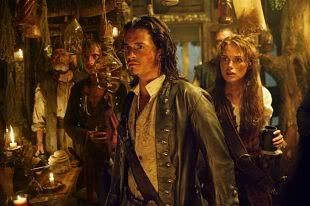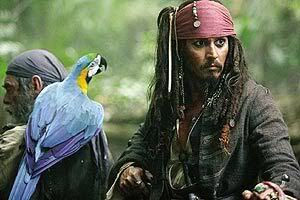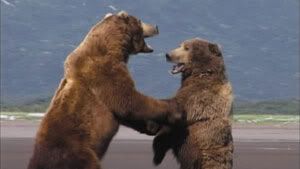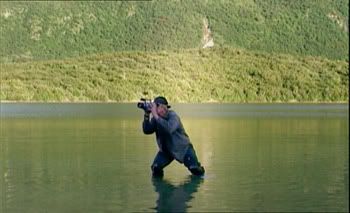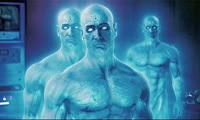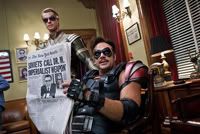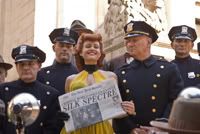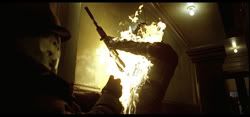| Sleezy | 07-04-06 05:01 PM |
Sleezy's Reviews
Although I've been a MoFo member for more than two years now, those of you who know me even a little bit shouldn't be the least bit surprised at the first film I've chosen to review (officially) on these message boards. I can't say I was waiting for it... but now that it's here, right now is as good a time as any to get started:
A couple weeks ago, a co-worker of mine gave me a VHS tape of the old 1940's Max Fleischer Superman cartoons. She knew I was a fan of Superman, saw the tape in a store for a few dollars, and - thinking of me - picked it up. What she didn't know was that, as a kid, I watched those old Fleischer Superman cartoons like crazy. I mean, like crazy. I only had a handful of episodes back then, but I watched them all. Over and over. All the time. I didn't care that they were so old. It was Superman, and that was enough.
My co-worker gave me this tape. I took it home. I dug for over an hour in the basement for my old top-loading VCR, found it, dusted it off, prayed to God that it still worked, and plugged it in. It worked, and so did the tape. There were no previews. There were no credits. There were no commercials. The cartoon just started.
I don't have to explain the quality of the tape. It was VHS, manufactured in 1989. It had probably sat on the store shelf for years before my co-worker finally bought it. And my top-loading, wood-panel VCR wasn't exactly helping. The picture was fuzzy, the sound was awful. But it didn't matter. I was starry-eyed and seven years old again.
I've been griping about Bryan Singer and Superman Returns for months. Those of you who read my posts, or who kept up with this thread and others, know that I've been griping. The suit. The actor. The storyline. To me, it all seemed very superficial and contrived, and I was afraid it would ruin Superman's return to the silver screen. I was already unimpressed with Bryan Singer's (in my opinion) mediocre film adaptations of X-Men, and I guess I expected him to draw from Superman the big-budget Hollywood flare that would sell tickets... but not the depth that would win hearts. Every trailer, every pre-production still, every piece of information told me that he would. And maybe he did.
As the title suggests, the film chronicles the return of Superman (Brandon Routh) after a 5-year absence from Earth. He flies out
to Krypton, visits the ghostly remains, and then flies back. During that time, the world changes... though not as much as we might expect. Lex Luthor (Kevin Spacey) has been released from prison, and has inherited a fortune. Lois Lane (Kate Bosworth), now with a young son, has taken to dating/living with Perry White's son, Richard (James Marsden). Jimmy Olsen is now old enough to drink. Everything else is pretty much the same. Prior to seeing the film, I was somewhat interested in Lois' reaction to Superman's departure. In one of the early trailers, Lois fumes, "Where did you go?" To me, the real-world reaction of Superman's return would have likely mirrored hers, and that's the film I wanted to see. Superman can punch through walls, melt steel with his eyes, and break the sound barrier... but is Superman really super enough to win back the hearts of the billions of people he left behind? And yet, in Superman Returns, no one other than Lois is very upset (which got me thinking, did anyone really care that he left in the first place?).
Anyway, the acting is about what I expected. Brandon Routh was clearly cast because of his resemblance to the late Superman film star, Christopher Reeve. Routh does an admirable job at re-creating the essence of Reeve's Superman, but never makes the role his own. Kate Bosworth is somewhat formulaic as Lois Lane, and far less charming than Margot Kidder. Bosworth only begins to become Lois late in the film, but it seems the writing failed her (and not her capacity to act). Initially, I was somewhat apprehensive about Kevin Spaceyís Lex Luthor. His scenes shown in the trailer seemed over-the-top, but I was glad to see that he made the character memorable without spiraling into camp. Spacey sprinkles a bit of Gene Hackman onto his portrayal, but leaves much of Luthor for himself. There were some moments where Spacey even resembled Hackman in appearance (usually while he was being shot in dramatic light); and while I still enjoy what Hackman started, I very much prefer what Spacey has now perfected. The most surprising bit of acting to come out of the film, however, came courtesy of James Marsden as Richard White. The role was a fresh one to be sure, but having seen Marsden get screwed out of really playing Cyclops in the X-films, I was delighted to see him play a genuinely good man and deliver believable lines. The role might have been fairly two-dimensional, but there was no real depth to any of the characters in the film (and Marsden very nearly stole the show).
Now, I'm about to discuss the plot, so if you haven't seen the film and don't want anything spoiled, close your eyes right now.
This film can be broken down into two parts: the first half, and the second half. The first half is a confused, bumbling mess. The second half is a real treat.
Superman Returns, having spring-boarded off two existing films shot over twenty years ago, rushes to catch up with the times in the first hour while still identifying itself with its predecessors. It does this immediately with the opening credits, which are very close to the Donner film opener (admittedly, I found myself somewhat excited by this). There are also several blatant nods to the original film scattered throughout, most of them early on.
Really, the first half is all about touching base on the major fronts, and getting things back to the ďway they were,Ē so that the film - which really isnít about Superman returning, ironically - can begin. I canít help but wonder why Singer and company didnít simply start fresh (a la Batman Begins), but whatever. We see Clark Kent return to the Daily Planet, which feels oddly like heís showing up for the first time. We see Lex Luthor bantering with Kitty Kowalski while heís scheming to take over the world (which again feels oddly like heís doing it for the first time). We see Superman take Lois Lane ďflying,Ē which - once again - feels oddly like... you get the idea. Having said all that, however, it was nice to re-visit what hasnít been glimpsed on film for more than two decades (which was, I think, Bryan Singerís whole reason for including them).
Before I discuss the second half of the film, which in many ways makes the whole experience worthwhile, I want to mention a few glaring problems I had with the plot:
The crux of the second half is Lex Luthor's plan to create a completely new island on Earth out of Kryptonian crystals he manages to swipe from the Fortress of Solitude. We see Luthor dabbling in some "mad scientist" kind of plot here and there early on, but we don't completely understand the gravity of it until Luthor himself explains what he's doing. And that, for me, was quite effective. Because while Luthor comes off as eccentric and
somewhat mad, you never expect that he's capable of killing billions of people until he tells you that he's going to do just that. And he doesn't care. That's the villain that makes you squirm in your seat. The subplot is Superman's history with Lois, and her young son who is quite obviously Superman's child before the film even presents the notion. The fact that Lois smokes while also having an asthmatic son notwithstanding, the film never really shows Lois being a mother - that is, until they get themselves trapped together on Luthor's houseboat. Suddenly, this traumatic ordeal brings them together, and it all feels strangely appropriate. Lois is in trouble, Luthor is behind it, and Superman is at work saving the city. This is where the real story begins.
I love to talk about scenes that "would-have-been" in films. You know, the ones that make you say, "oh, if they had just done this or this..." In Superman Returns, the closest Singer got to showing what Superman was really made of outside his super-strength and X-ray vision came when he, while depowered by Kryptonite, found himself getting the holy crap kicked out of him by three hired henchmen. Suddenly, Superman is made virtually human. He bleeds. He hurts. He's beatable. And he's fighting three guys. Well, I've always liked to think that Superman didn't get his name because he could fly and throw automobiles. He got the name because, stripped of his powers, he's still made of more than you and I could ever dream of having. What I would have given to see Superman, depowered and outnumbered, put those three henchmen on the ground...
Skip ahead to Superman falling out of the sky. He's rushed to the hospital, and we're force fed the imagery of the common people whom Superman saves now saving him. Superman is dying, and we see a newspaper with the heartbreaking headline, and I'm reminded of Superman's comic book death. Around the country, millions mourned him. They actually mourned him. People held silent vigil in the streets. Others observed moments of silence at sporting events, concerts, religious gatherings. Never has any fictional character's death received so much heartfelt attention.
Cut to Lois, Richard, and Jason in the car outside the hospital. Until now, the film didn't get me. It got me at the car. Lois wants to go in to see Superman. Jason (her son) wants to "go with mommy." It occurred to me, then, that this is Superman's family. Going to see him as he lay dying. It brought everything down to my level. I've done this. I know this life. And in some small way, Superman is just like me. It's that level of identification between viewer and film that makes the experience worthwhile, and I wasn't expecting to find it here.
So, if you wait long enough, youíll find a heart at the center of this gift-wrapped Hollywood press bag. I found myself left with a product that was, in many ways, flawed and unfinished - but that still managed to make me feel something. The biggest regret, I think, is rooting against Richard White. But then again, itís the writerís fault for penning the film into a social corner. What becomes of the child? What happens to Richard, the poor soul whoís about to find out that Jason really isnít his kid? And what responsibility, if any, will Superman take? Itís a sequel I donít really want to see.
What I ultimately take from Superman Returns is much what I've put into Superman over the years. Iíve read the comics. Iíve watched the cartoons and T.V. shows. Iíve eaten the cereal, worn the pajamas, played with the action figures. But Iíve also looked into the character. I know who Superman is. He's the ultimate moral symbol. Yes, he's super-strong, and he can fly, and all that stuff. But beyond that, he's a moral man. He has made a conscious decision to use his gifts to protect those who are not even his own people. In doing so, he inspires us to be better than who and what we are, to practice bravery in the face of adversity, to defend those who are different from us, to choose morality and selflessness over greed. To look inside oneself for strength, and to share that strength with the world. My life and my actions have, in many ways, been shaped by Superman. Iíve grown up with him, and he grounds my existence the way others are grounded by baseball, or Grease, or whatever piece of Americana from which they derive meaning and understanding.
The film, by itself, is decent. But itís my admiration of Superman that makes it special. That, I think, is the most impressive thing about Superman. That this Man of Steel is really made of dreams - the collective dreams of everyone whoís ever wanted to be like him - and that no matter how many times he changes, no matter how many interpretations are derived from him, Superman will always unite those of us who look to the sky.
SUPERMAN RETURNS
A couple weeks ago, a co-worker of mine gave me a VHS tape of the old 1940's Max Fleischer Superman cartoons. She knew I was a fan of Superman, saw the tape in a store for a few dollars, and - thinking of me - picked it up. What she didn't know was that, as a kid, I watched those old Fleischer Superman cartoons like crazy. I mean, like crazy. I only had a handful of episodes back then, but I watched them all. Over and over. All the time. I didn't care that they were so old. It was Superman, and that was enough.
My co-worker gave me this tape. I took it home. I dug for over an hour in the basement for my old top-loading VCR, found it, dusted it off, prayed to God that it still worked, and plugged it in. It worked, and so did the tape. There were no previews. There were no credits. There were no commercials. The cartoon just started.
Faster than a speeding bullet!
More powerful than a locomotive!
Able to leap tall buildings in a single bound!
More powerful than a locomotive!
Able to leap tall buildings in a single bound!
I don't have to explain the quality of the tape. It was VHS, manufactured in 1989. It had probably sat on the store shelf for years before my co-worker finally bought it. And my top-loading, wood-panel VCR wasn't exactly helping. The picture was fuzzy, the sound was awful. But it didn't matter. I was starry-eyed and seven years old again.
***
I've been griping about Bryan Singer and Superman Returns for months. Those of you who read my posts, or who kept up with this thread and others, know that I've been griping. The suit. The actor. The storyline. To me, it all seemed very superficial and contrived, and I was afraid it would ruin Superman's return to the silver screen. I was already unimpressed with Bryan Singer's (in my opinion) mediocre film adaptations of X-Men, and I guess I expected him to draw from Superman the big-budget Hollywood flare that would sell tickets... but not the depth that would win hearts. Every trailer, every pre-production still, every piece of information told me that he would. And maybe he did.
As the title suggests, the film chronicles the return of Superman (Brandon Routh) after a 5-year absence from Earth. He flies out
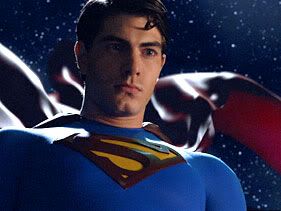
|
Anyway, the acting is about what I expected. Brandon Routh was clearly cast because of his resemblance to the late Superman film star, Christopher Reeve. Routh does an admirable job at re-creating the essence of Reeve's Superman, but never makes the role his own. Kate Bosworth is somewhat formulaic as Lois Lane, and far less charming than Margot Kidder. Bosworth only begins to become Lois late in the film, but it seems the writing failed her (and not her capacity to act). Initially, I was somewhat apprehensive about Kevin Spaceyís Lex Luthor. His scenes shown in the trailer seemed over-the-top, but I was glad to see that he made the character memorable without spiraling into camp. Spacey sprinkles a bit of Gene Hackman onto his portrayal, but leaves much of Luthor for himself. There were some moments where Spacey even resembled Hackman in appearance (usually while he was being shot in dramatic light); and while I still enjoy what Hackman started, I very much prefer what Spacey has now perfected. The most surprising bit of acting to come out of the film, however, came courtesy of James Marsden as Richard White. The role was a fresh one to be sure, but having seen Marsden get screwed out of really playing Cyclops in the X-films, I was delighted to see him play a genuinely good man and deliver believable lines. The role might have been fairly two-dimensional, but there was no real depth to any of the characters in the film (and Marsden very nearly stole the show).
Now, I'm about to discuss the plot, so if you haven't seen the film and don't want anything spoiled, close your eyes right now.
***
This film can be broken down into two parts: the first half, and the second half. The first half is a confused, bumbling mess. The second half is a real treat.
Superman Returns, having spring-boarded off two existing films shot over twenty years ago, rushes to catch up with the times in the first hour while still identifying itself with its predecessors. It does this immediately with the opening credits, which are very close to the Donner film opener (admittedly, I found myself somewhat excited by this). There are also several blatant nods to the original film scattered throughout, most of them early on.
Really, the first half is all about touching base on the major fronts, and getting things back to the ďway they were,Ē so that the film - which really isnít about Superman returning, ironically - can begin. I canít help but wonder why Singer and company didnít simply start fresh (a la Batman Begins), but whatever. We see Clark Kent return to the Daily Planet, which feels oddly like heís showing up for the first time. We see Lex Luthor bantering with Kitty Kowalski while heís scheming to take over the world (which again feels oddly like heís doing it for the first time). We see Superman take Lois Lane ďflying,Ē which - once again - feels oddly like... you get the idea. Having said all that, however, it was nice to re-visit what hasnít been glimpsed on film for more than two decades (which was, I think, Bryan Singerís whole reason for including them).
Before I discuss the second half of the film, which in many ways makes the whole experience worthwhile, I want to mention a few glaring problems I had with the plot:
*First, Clark Kent is reduced to virtually nothing, so much so that while Superman is pretty much incapacitated late in the story, no one even thinks to ask where Clark Kent has gone. Which resurrects, in my opinion, the most embarrassing aspect of Superman: the collective density of everyone around Clark Kent to never realize that heís NOT Superman. And in Singerís film, this is made dreadfully obvious on more than one occasion.
*Second, Bryan Singer has decided to translate Superman into Jesus Christ, which is such an obvious connection these days that when someone gives in and indulges it, we all roll our eyes in unison.
*And third, there is absolutely no chemistry between Routh and Bosworth. Not one ounce. Not even a spitís worth. Their scenes together are so utterly contrived, and it really felt like I was being carried through the motions. The only moment between them which really won me over came later, and it was hardly the result of the scenes they shared before coming to it. (There was one shot during the romantic flying sequence that caught me off-guard. It was simply a shot of Superman and Loisí hands clasped tightly, seemingly with conviction and resolve.)
***
The crux of the second half is Lex Luthor's plan to create a completely new island on Earth out of Kryptonian crystals he manages to swipe from the Fortress of Solitude. We see Luthor dabbling in some "mad scientist" kind of plot here and there early on, but we don't completely understand the gravity of it until Luthor himself explains what he's doing. And that, for me, was quite effective. Because while Luthor comes off as eccentric and
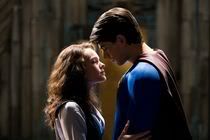
|
I love to talk about scenes that "would-have-been" in films. You know, the ones that make you say, "oh, if they had just done this or this..." In Superman Returns, the closest Singer got to showing what Superman was really made of outside his super-strength and X-ray vision came when he, while depowered by Kryptonite, found himself getting the holy crap kicked out of him by three hired henchmen. Suddenly, Superman is made virtually human. He bleeds. He hurts. He's beatable. And he's fighting three guys. Well, I've always liked to think that Superman didn't get his name because he could fly and throw automobiles. He got the name because, stripped of his powers, he's still made of more than you and I could ever dream of having. What I would have given to see Superman, depowered and outnumbered, put those three henchmen on the ground...
Skip ahead to Superman falling out of the sky. He's rushed to the hospital, and we're force fed the imagery of the common people whom Superman saves now saving him. Superman is dying, and we see a newspaper with the heartbreaking headline, and I'm reminded of Superman's comic book death. Around the country, millions mourned him. They actually mourned him. People held silent vigil in the streets. Others observed moments of silence at sporting events, concerts, religious gatherings. Never has any fictional character's death received so much heartfelt attention.
Cut to Lois, Richard, and Jason in the car outside the hospital. Until now, the film didn't get me. It got me at the car. Lois wants to go in to see Superman. Jason (her son) wants to "go with mommy." It occurred to me, then, that this is Superman's family. Going to see him as he lay dying. It brought everything down to my level. I've done this. I know this life. And in some small way, Superman is just like me. It's that level of identification between viewer and film that makes the experience worthwhile, and I wasn't expecting to find it here.
So, if you wait long enough, youíll find a heart at the center of this gift-wrapped Hollywood press bag. I found myself left with a product that was, in many ways, flawed and unfinished - but that still managed to make me feel something. The biggest regret, I think, is rooting against Richard White. But then again, itís the writerís fault for penning the film into a social corner. What becomes of the child? What happens to Richard, the poor soul whoís about to find out that Jason really isnít his kid? And what responsibility, if any, will Superman take? Itís a sequel I donít really want to see.
***
What I ultimately take from Superman Returns is much what I've put into Superman over the years. Iíve read the comics. Iíve watched the cartoons and T.V. shows. Iíve eaten the cereal, worn the pajamas, played with the action figures. But Iíve also looked into the character. I know who Superman is. He's the ultimate moral symbol. Yes, he's super-strong, and he can fly, and all that stuff. But beyond that, he's a moral man. He has made a conscious decision to use his gifts to protect those who are not even his own people. In doing so, he inspires us to be better than who and what we are, to practice bravery in the face of adversity, to defend those who are different from us, to choose morality and selflessness over greed. To look inside oneself for strength, and to share that strength with the world. My life and my actions have, in many ways, been shaped by Superman. Iíve grown up with him, and he grounds my existence the way others are grounded by baseball, or Grease, or whatever piece of Americana from which they derive meaning and understanding.
The film, by itself, is decent. But itís my admiration of Superman that makes it special. That, I think, is the most impressive thing about Superman. That this Man of Steel is really made of dreams - the collective dreams of everyone whoís ever wanted to be like him - and that no matter how many times he changes, no matter how many interpretations are derived from him, Superman will always unite those of us who look to the sky.
